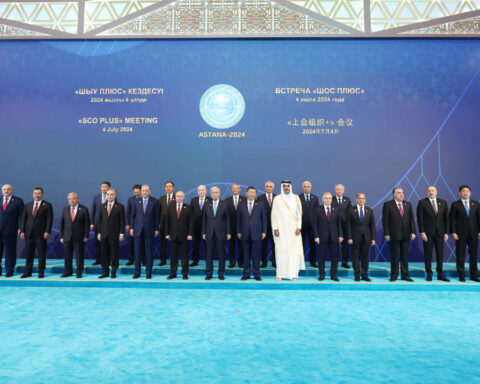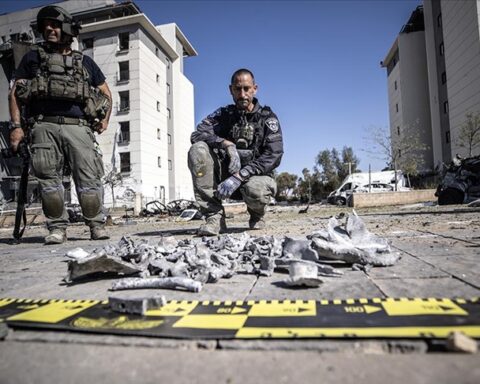First off, where are they going to invade from? Iraq has US troops stationed in the country, but they have solid relations with the Iranians at this point. There is basically no chance the Iraqis allow the US military to stage an invasion from there and neither Iraq or Afghanistan are under direct US occupation any longer. Which means they would need to perform an amphibious invasion from the Persian Gulf if they were to launch a full scale assault on Iran. This would be the largest amphibious invasion attempt since D-Day and would result in heavy American casualties on the beaches of Iran. Tehran has tons of ballistic and cruise missiles, as well as some of largest stockpiles of artillery in the world, and their allies (China, Russia, and North Korea) can help arm them easily with more of these in the result of a full scale American-Israeli invasion. Simply put, it would be an incredibly difficult and costly military operation.
Secondly, even if the US is willing to endure heavy casualties, which is by no means guaranteed, as tens of thousands of Americans dying in a war in the Middle East will not be popular domestically, then they would still need to traverse rugged and mountainous terrain in order to get to Tehran, conquer it, and dislodge the regime from power. This would be like fighting in the jungles of Vietnam only much worse.
50k+ Americans died in roughly 8 years of fighting there. In Iran, there would likely be tens of thousands of dead Americans per year. Is the US Government and American public willing to stomach losses like that?
Losses unheard of in the American empire since at least Vietnam and Korea, perhaps even WWII if it gets ugly enough as it has in the Russo-Ukrainian War where there have been hundreds of thousands of deaths in a little over 3 years. There would surely be a sizable level of resistance in the US if a war is launched against the Iranians, and the US Government has to weigh these factors in when considering using military force for regime change operations. They likely don’t want to create the biggest anti-war movement in the country since Vietnam, which could also increase dissent regarding other issues in the country. A war with Iran would radicalize a good amount of Americans.
Thirdly, there are several geo-strategic considerations to factor in as well with regional allies of the US. A war of any kind on Iran would not be supported by the Saudi’s at this point and Iran can inflict severe damage onto American assets in the region which are stationed in places like Bahrain, Kuwait, Jordan, etc. These countries don’t want to be dragged into being a theater of the war, nor do they want their energy sectors attacked which Iran has threatened to do if they are invaded by the US military. Tehran has threatened to attack critical infrastructure in neighbors hosting American forces and is the US Government willing to take this risk?
Additionally, there’s always the possibility that an American-Israeli war on Iran could metastasize into WWIII. China gets roughly 40% of their oil from the Persian Gulf, which would surely be shutdown for some time in the event of an American invasion of Iran.
Will China sit idly by? Not likely. At the very minimum they would help arm Iran to defend itself, but there’s simply a inherent risk of global conflict given a third of world energy supplies come from this region. Middle East energy is existential to China right now as it stands. They’re expanding oil and gas imports from Russia, but these will take time to get Beijing less reliant on Middle East resources.
Would China directly intervene militarily? That’s impossible to know for certain, but I suspect they wouldn’t. Xi Jinping is a ruthless dictator but he seems to understand that your military is most valuable when it doesn’t have to be used. Not to mention the Chinese military doesn’t have the experience of performing large-scale deployments of their forces for military intervention at this point. They’ve only invaded Tibet and Vietnam in the last 70+ years. Conquering Tibet was like stealing land from peasants and Vietnam taught Beijing the costs of guerilla warfare as an invading force by killing 7k Chinese soldiers in just a single month of fighting. Simply put, China underperformed in that war. While their military is catching up to the US in terms of technological capabilities, they don’t have the combat experience and doctrine to pull off a massive military intervention on behalf of Iran at this stage would be my guess.
China also surely understands if they intervened militarily in Iran, it’s a region the US military is deeply entrenched in. Simply put, China would be at a sizable disadvantage in terms of military conflict against the US in the Middle East. Plus, it would likely mean other Western powers getting involved too, and this would be a costly war for China that may end up derailing their development and efforts at supplanting US hegemony. China is much more likely to attempt an invasion of Taiwan if the US were to over commit itself in the Middle East.
Which brings up another reason the US won’t stretch itself too thin by launching a full scale invasion of Iran. China invading Taiwan is a real threat, and while I personally don’t think Beijing will ever pull that trigger (if China does anything, it would be a blockade of the country with the PLA Navy, forcing Washington to choose between military intervention and WWIII or potentially collapsing the American security and alliance system, also known as empire, in at least the East Asia/Indo-Pacific region), it is nonetheless a possibility the US Government must consider. We just simply don’t know how the American and Chinese regimes weigh their considerations of starting global war versus societal energy needs, or dominance of global energy supplies in the case of the US of course. The US hasn’t needed Middle East oil for years at this point but they have had control of it since 1945, and the fascists and plutocrats in Washington don’t want to lose that power, nor do American corporations want to lose their leading cash cow. There is much at stake here.
But a full scale war with Iran, given all the inherent risks and known dangers involved? It seems improbable. What’s far more likely to occur is a multi-week long bombing campaign by the Israelis, while the Iranians hit them back tit-for tat as well. They’re developing a new status quo of lethal retaliatory attacks but nothing like the 10/7 operation by Hamas with Iranian logistical support of course. Once they get 3-6 weeks into this air assault from the IDF, then it will be more clear just how much help the Israelis may need to takeout Iran’s nuclear facilities and degrade their military capabilities effectively.
If any direct US involvement occurs, outside of the intelligence and weapons they supply the Israelis with, then it’s most likely to be a bombing campaign aimed to inflict severe damage on Iranian infrastructure in order to undercut their economic stability, in the hopes of creating popular discontent to topple the regime. Instead of a full scale invasion, the US Government would probably try to induce regime collapse through a policy of severe military and economic strangulation, accompanied by airstrikes, sea-launched cruise missiles, and the deployment of US special forces which are the most elite and effective in the world.
The early stages of this would target Iran’s existing military infrastructure, including air bases, naval bases, air defenses, and ballistic missile installations. Irans naval and air forces could be destroyed and rendered obsolete by the Americans and Israelis if they so choose. Why invade with ground troops when you can simply station your carriers out of range from Iranian missiles and still attack from air and distance? To this end, the US would target Iran’s economy, including oil installations and transport infrastructure. Such attacks could effectively destroy Iran’s oil industry, at least in the short term, and cause serious economic damage.
They wouldn’t be able to takeout Iran’s ground capabilities, though, and Tehran would have a range of options to respond with. They could increase efforts to destabilize Iraq through their proxies by attacking American forces. As mentioned, they could also use their extensive fleet of ballistic missiles to attack US bases and ships, as well as the military and energy installations of American allies in the region. Most likely, however, is that Iran could simply wait, with the logic in mind that international opinion against the US would steadily build until Washington could no longer maintain its belligerence.
Regime change is unlikely to succeed, and any military action from US against Iran will only exacerbate the problems it was intended to solve. Any US attack against Iran will likely trigger a nationalist backlash, making the public more supportive of the regime in the short term. An attack would also enable the regime to install more draconian social and economic controls. These controls might generate backlash over time, but toppling the regime is not certain. The US also lacks broad international support for a campaign of regime change. Even allies like Saudi Arabia would likely balk at the long-term costs that the war would create. Both China and Russia would likely intervene in ways designed to ease the pressure on Tehran. Europeans would react with heavy public disapproval, eventually forcing even sympathetic leaders in France and the UK to distance themselves from US policy.
It’s simply unclear how such a military intervention would end. The US lacks the international support to undertake the sort of militarized containment that it used against Iraq during the 1990’s. International sympathy for Iran would only increase over time, a fact that leaders in Tehran surely understand. If Iran didn’t collapse, the US would eventually have to either admit defeat or open the door to dangerous escalation via ground invasion. However, even if the campaign failed to dislodge the regime, it could cause significant long-term damage to Tehran’s military, economic and scientific infrastructure, setting back the ambitions of the Iranian empire in the region. Regime change might work, but there’s little reason to believe the chances of such are high. A war would incur serious costs on Iran, but would also commit the US to the destruction of Persia, a process that could take decades if possible. They’d be wise to learn from history and deescalate.
*Grant Inskeep is an activist from Denver, Colorado currently based out of Phoenix, Arizona. He writes on socioeconomics, philosophy and geopolitics on Instagram @the_pragmatic_utopian.
Source: https://www.counterpunch.org/2025/06/17/why-america-wont-launch-a-war-on-iran/






